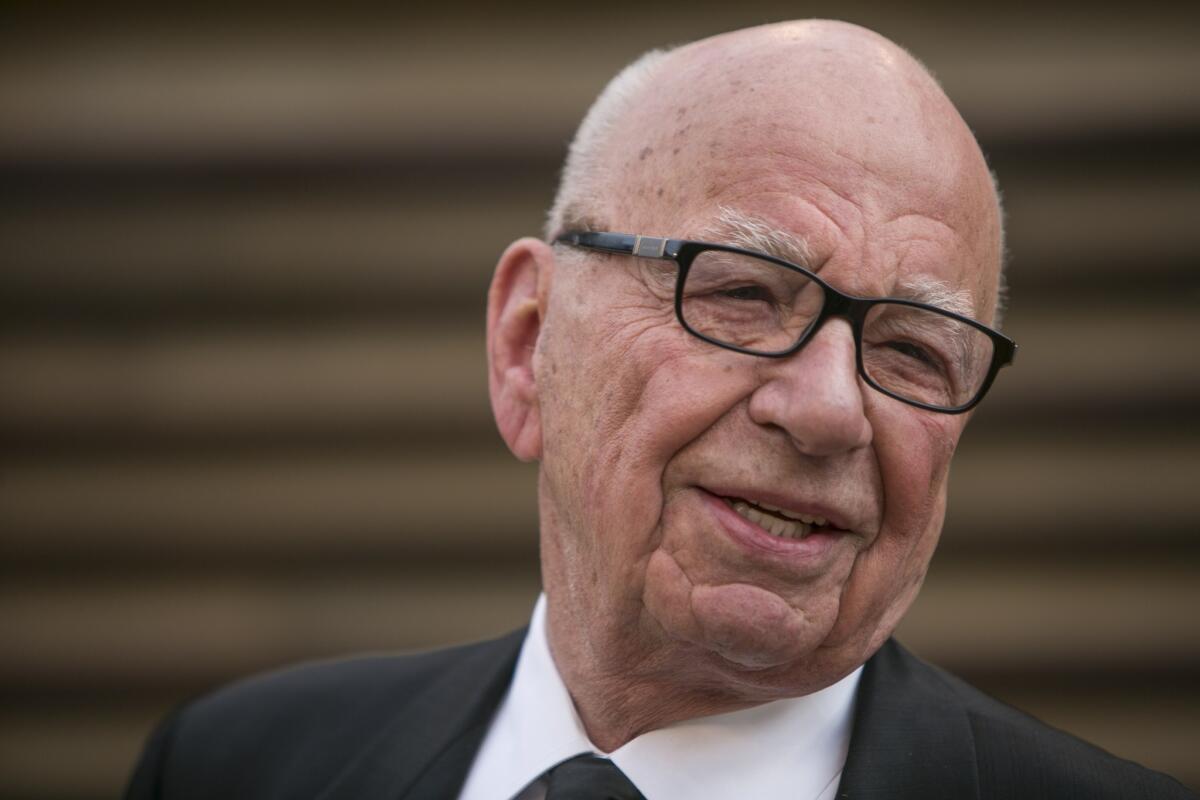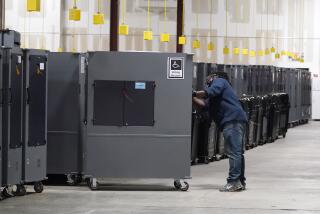Fox nominates activist shareholder Jeffrey Ubben of ValueAct Capital to board

Rupert Murdoch arrives at Vanity Fair Oscar Party in West Hollywood on March 2, 2014.
Rupert Murdoch is typically wary of outside investors who gobble up big chunks of his companies’ voting shares, but this week Murdoch’s 21st Century Fox offered a board seat to accommodate an activist shareholder seeking greater involvement in the company’s affairs.
On Tuesday, Fox said it had invited Jeffrey W. Ubben, 54, co-founder and chief executive of ValueAct Capital, to fill a newly created seat on its board.
ValueAct Capital, which manages more than $19 billion in assets, has been buying up Fox shares for more than a year. The San Francisco firm has accumulated nearly 6% of the voting shares, making it the third-largest Fox shareholder. Murdoch and his family control 39% of the voting shares, and Saudi Arabia Prince Alwaleed bin Talal holds 6.6%.
“The rapidly changing media landscape presents significant opportunities, and I believe 21st Century Fox is uniquely positioned to leverage its global presence and market leadership to create further long-term value for all stockholders,” Ubben said in a statement, distributed by Fox, announcing his nomination.
ValueAct Capital invests in a small number of companies that it believes are undervalued, and then becomes actively involved in the company’s turnaround efforts. The firm has invested in Microsoft Corp., Valeant Pharmaceuticals International Inc., Motorola Solutions Inc. and Adobe Systems Inc. ValueAct tends to hold on to its investments longer than most hedge funds, which seek to cash out within five years. ValueAct doesn’t appear to employ the high-profile tactics of Carl Icahn or other activist shareholders.
A 2014 Bloomberg News story described Ubben as “the quiet instigator behind some of the highest-profile corporate overhauls.”
ValueAct scooped up more than $1 billion in Fox stock in 2014 as investors started to abandon Fox after its failed $80-billion takeover of Time Warner Inc.
Fox’s stock has been pummeled this year, falling more than 30%, part of a larger Wall Street sell-off of media stocks.
Fox’s widely traded A shares closed up 61 cents, or 2.4%, to $25.80 on Tuesday.
As part of the high-level wrangling, Fox negotiated a pact with ValueAct that seeks to limit the firm’s influence. The agreement stipulates that for at least a year, ValueAct would be forbidden from waging proxy battles, blocking any large transactions the company was pursuing or even speaking out about such deals. ValueAct cannot own more than 7% of Fox’s voting shares.
Murdoch, Fox’s co-chairman, has long been aggressive in limiting the power of other shareholders to protect his family’s control of their empire. The company has occasionally adopted poison-pill measures. Nearly a decade ago, Murdoch gave up his promising investment in DirecTV as part of a deal to force cable mogul John Malone’s Liberty Media to surrender its stake in Murdoch’s company, then called News Corp.
Ubben will stand for election Nov. 12 when 21st Century Fox holds its annual meeting in Los Angeles.
Fox also disclosed that Murdoch in fiscal 2014 received compensation of $27.9 million, a nearly 5% decline from the previous year. James Murdoch, who became CEO in July, received compensation of $15 million, down 19% from fiscal 2013. Chase Carey, the outgoing chief operating officer, received a package valued at $23.2 million, 17% lower.
James Murdoch and Carey’s 2014 compensation decreased because the value of their pension and deferred compensation plans was lower compared with the previous year.
meg.james@latimes.com
Twitter: @MegJamesLAT
More to Read
From the Oscars to the Emmys.
Get the Envelope newsletter for exclusive awards season coverage, behind-the-scenes stories from the Envelope podcast and columnist Glenn Whipp’s must-read analysis.
You may occasionally receive promotional content from the Los Angeles Times.







